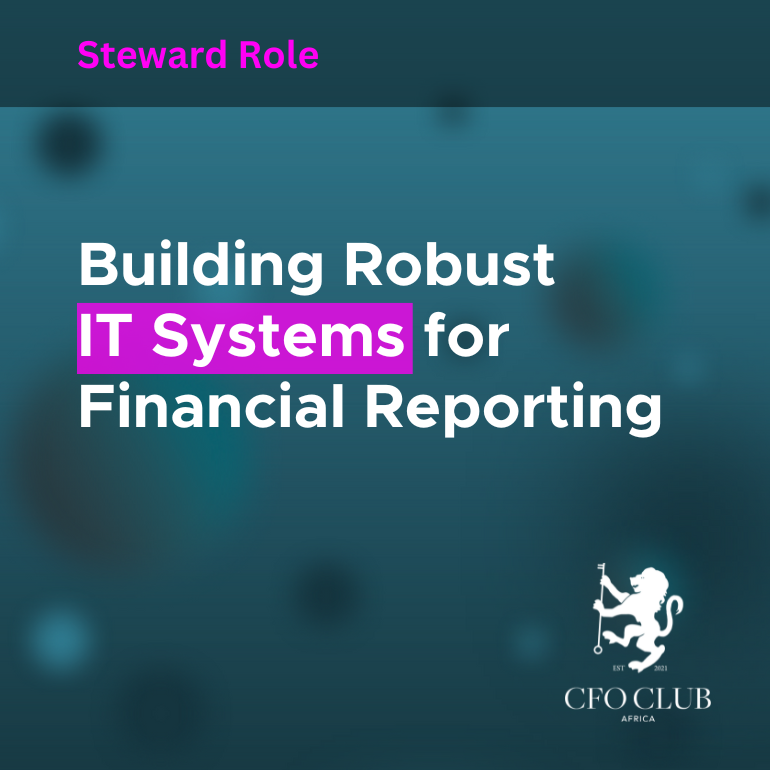Building Robust IT Systems for Financial Reporting
As financial operations become increasingly complex, having the right IT infrastructure in place is no longer just a back-office necessity—it’s a strategic advantage. For CFOs, ensuring that financial data is accurate, secure, and easily accessible is essential to driving sound decision-making and maintaining regulatory compliance. In this article, we’ll explore practical steps for building IT systems that can support effective financial reporting, with real-world examples to help you implement these strategies in your organization.
1. The Importance of a Robust IT System
A well-structured IT system streamlines financial reporting processes, ensuring data accuracy, reducing manual errors, and enabling real-time reporting. CFOs often deal with large volumes of financial data, and the ability to quickly access and report on this data can make or break strategic decision-making.
For example, consider a large retail chain that has stores across South Africa. Without a solid IT system, consolidating sales data from different stores for monthly reporting can be a nightmare. With a robust system in place, real-time sales data from all locations can be automatically pulled into the financial reports, reducing the time spent on manual entries and increasing data accuracy.
2. Key Components of a Robust IT System for Financial Reporting
There are several key components that CFOs must ensure are in place when building a robust IT system for financial reporting:
- Integrated Financial Software: The financial software should integrate seamlessly with other business systems like inventory management, payroll, and CRM (Customer Relationship Management). This allows for smooth data flow and eliminates duplication or manual data entry errors.
A CFO in a manufacturing company can have their financial software integrated with the production system to automatically pull cost data, ensuring accurate and timely reporting of cost of goods sold.
- Cloud-Based Solutions: Cloud technology allows CFOs and their teams to access financial data anytime, anywhere. It also facilitates real-time reporting and ensures that data is backed up and secure. For South African businesses operating in multiple regions, cloud-based solutions enable faster collaboration and data sharing.
A construction company with projects in different provinces can have a cloud-based financial reporting system that allows site managers to upload expenses and invoices in real-time, ensuring that headquarters can consolidate project costs without delays.
- Data Security and Compliance: With growing concerns around cyber threats and data breaches, CFOs must ensure their IT systems have the necessary security protocols in place, such as encryption and two-factor authentication. The system should also comply with local regulations like POPIA (Protection of Personal Information Act) in South Africa.
A medical practice may handle sensitive patient billing data. By integrating secure, compliant software, the CFO can ensure that financial data is protected while meeting regulatory requirements.
3. Scalability and Flexibility
Financial reporting needs evolve as businesses grow, so it’s essential that IT systems are scalable. A system that works for a small business today might not meet the needs of a rapidly expanding company tomorrow. CFOs should invest in systems that can grow with the business and adapt to new reporting requirements.
A tech startup might start with basic financial software, but as it scales and perhaps looks for external investment, the CFO will need systems that support more detailed and sophisticated financial reporting, such as investor reporting and compliance with IFRS standards.
4. Automation to Reduce Human Error
One of the primary benefits of a robust IT system is the ability to automate repetitive financial tasks. Automation reduces human error, which is one of the biggest risks in financial reporting.
Instead of manually reconciling bank statements with company financials, an automated reconciliation tool can pull transaction data directly from the bank and match it against internal records, flagging discrepancies for review. This saves time and ensures higher accuracy in reporting.
5. Training and Support
Even the best IT systems are only as good as the people who use them. CFOs need to ensure that their teams are trained to use the financial reporting tools effectively. Regular training sessions and access to a support system are essential to maintain a high level of efficiency.
A CFO in an agricultural business ensures that the finance team receives ongoing training on the use of new reporting software and updates. This guarantees that everyone knows how to extract and use the data correctly, resulting in accurate financial reports every time.
5. Regular Updates and System Audits
Technology changes fast and staying up-to-date is crucial for maintaining system security and efficiency. CFOs should ensure that their IT systems are regularly updated to avoid security vulnerabilities or inefficiencies. Additionally, regular system audits can help identify and fix any issues before they become significant problems.
A retail business with an online store may regularly audit its IT system to ensure that financial transactions from online sales are being accurately captured and reflected in the financial statements.
A Roadmap to Financial Reporting Excellence
Building and maintaining robust IT systems for financial reporting is not a one-time event; it’s an ongoing process. By focusing on integration, security, automation, scalability, and continuous improvement, CFOs can ensure that their financial reporting systems are up to the task of meeting today’s challenges while being ready for tomorrow’s opportunities.
To walk away with practical action points:
- Invest in scalable, cloud-based solutions that integrate with other business systems.
- Prioritise security and compliance to protect financial data.
- Automate repetitive tasks to reduce human error and increase efficiency.
- Train your team to use these systems effectively and support them with ongoing education.
- Regularly audit and update your IT systems to ensure they remain effective and secure.
By following these steps, CFOs can build a financial reporting system that not only supports their current needs but also drives future business growth.

